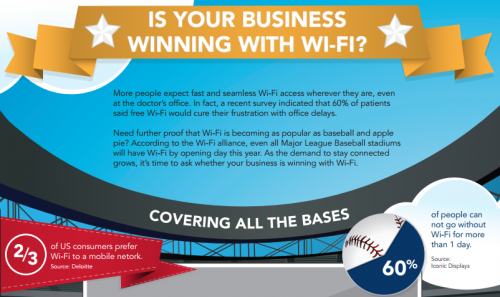Is Your Small Business Winning With Wi-Fi?
In a recent survey conducted by research firm iGR, 77 percent of small businesses rated Wi-Fi as “important” or “very important” to their businesses. While leveraging reliable Wi-Fi is critical from an operational standpoint, the main driver behind why small businesses are increasingly relying on better wireless connectivity is because of the relevance it has in the lives of their customers.

With the increasing demand and desire for everyone to always be connected, and the expectation of real-time access to information, small businesses are facing a whole new ball game. Now, quality Wi-Fi has become a must-have and if you’re not delivering that you run the risk of diminishing the customer experience and losing business. It’s time to ask yourself whether or not your small business is winning with Wi-Fi.
Hitting a Home Run with Customers
Save your customers the disappointment of no access. Offering free, high-speed Wi-Fi provides a better overall experience and can actually work as a marketing tactic to attract more customers. Restaurants, for example, have found that customers stay longer and spend more money when they are offered free Wi-Fi.
Additionally, small businesses that require customers to wait for appointments or services like auto repair shops, law and medical offices see free Wi-Fi as a tool to help keep customers and clients busy, happy, and productive. This is seemingly a win with patients, as a recent survey conducted by Software Advice indicated that 60 percent think free Wi-Fi would cure their frustrations with office delays.
Slow Wi-Fi Will Cost You
While no Wi-Fi is certainly an impairment to small businesses, slow Wi-Fi also can be detrimental. As a result of sluggish connectivity, productivity lags as sites and files take too long to load and networked printers and scanners stall. These extra minutes, spread throughout the day, add up over a year’s time to cost your business significantly.
Additionally, slow Wi-Fi hinders your ability to mobilize your business with tablets and smartphones. The general population checks their mobile devices an average of 150 times a day. In fact, you might be reading this article on your iPad or smartphone. With that in mind, your customers—who have essentially become connection connoisseurs— are much more likely to be unsatisfied with low quality, slow Wi-Fi.
The Playing Field for Small Businesses Has Leveled
With increasingly more affordable options, smaller businesses now have an easier path to obtaining grade “A”, fast Wi-Fi. For this reason, they now can compete and hold their own against much larger companies. With its help, independently-owned restaurants, for example, can establish a strong sense of community and grow their respective customer base by becoming a meeting spot for various social groups.
Additionally, local boutiques that offer free and fast Wi-Fi can provide shoppers with the opportunity to browse and compare price and selection of products in-store, which can lead to increasingly more sales. In fact, a survey conducted by Wakefield Research on behalf of the Wi-Fi Alliance found that 69 percent of shoppers use their mobile devices to research or compare prices on an item while in-store. Furthermore, one in three said they had to abandon a purchase because they couldn’t research on their mobile device.
The Bottom Line
In the long run, investing in fast, high-quality Wi-Fi will pay off for small businesses. It’s no longer considered a luxury; it’s a necessity for customers who now demand a superior in-location experience to remain loyal and continue to spend money. Beyond that, strong connectivity makes small businesses more efficient and provides a competitive advantage.
For more insight on the benefits of business Wi-Fi take a look at the recent infographic from Cox Business titled, “Is Your Business Winning with Wi-Fi?”
About Steve Rowley:
Steve Rowley serves as Senior Vice President of Cox Business, overseeing its strategic direction, including all marketing, operations, sales, product development and partnership initiatives. Before leading Cox Business he was vice president of sales and field operations for Cox Business’ western U.S. markets where he served as the chief liaison between corporate headquarters and the western markets with oversight on local strategic planning, sales performance, marketing, back office, customer installations and capital investment.
No related posts.
